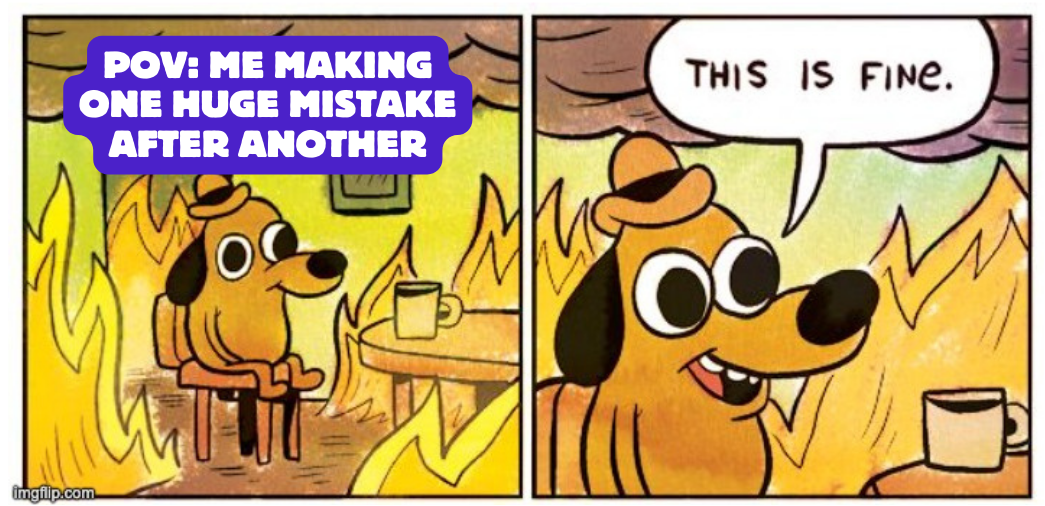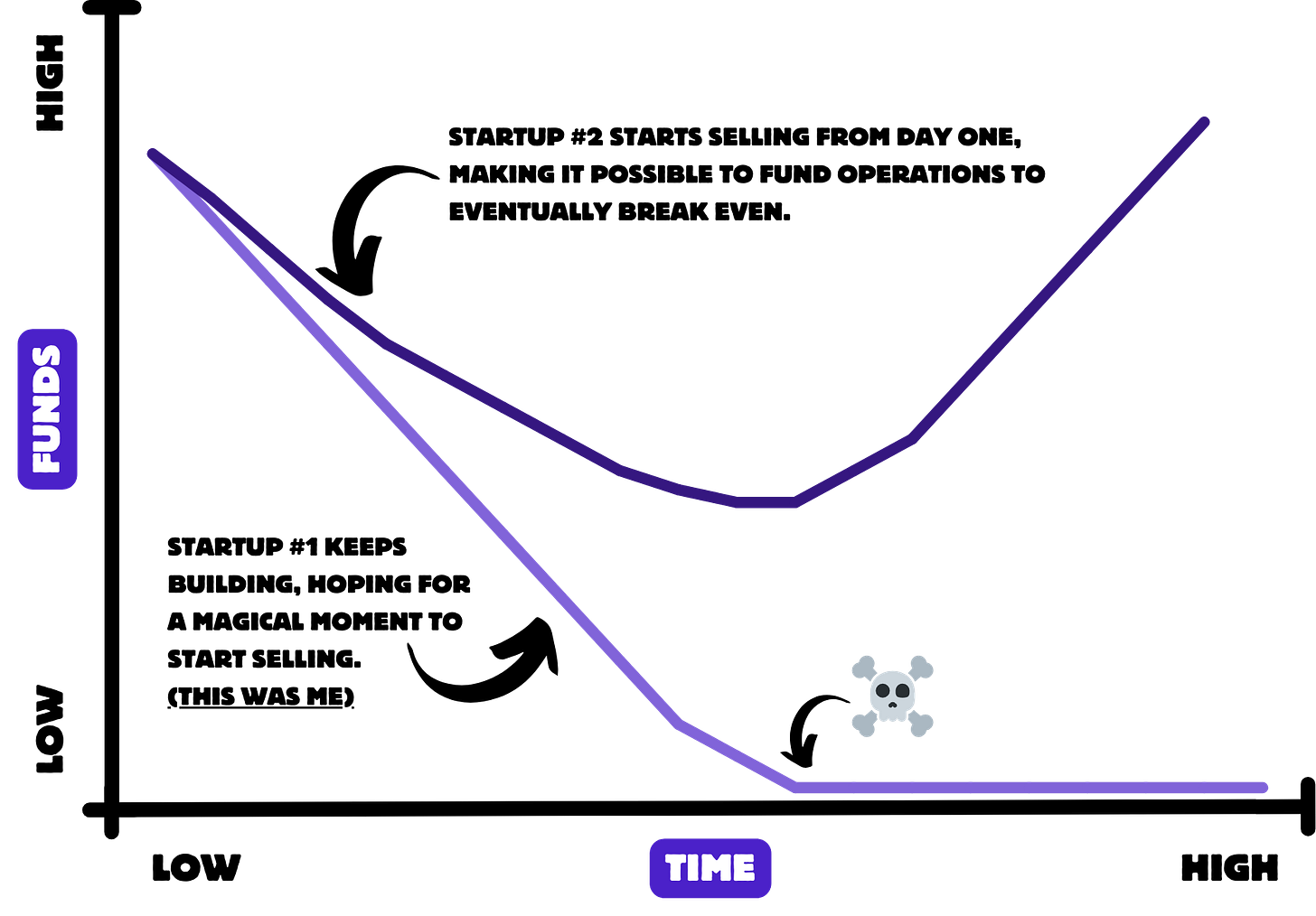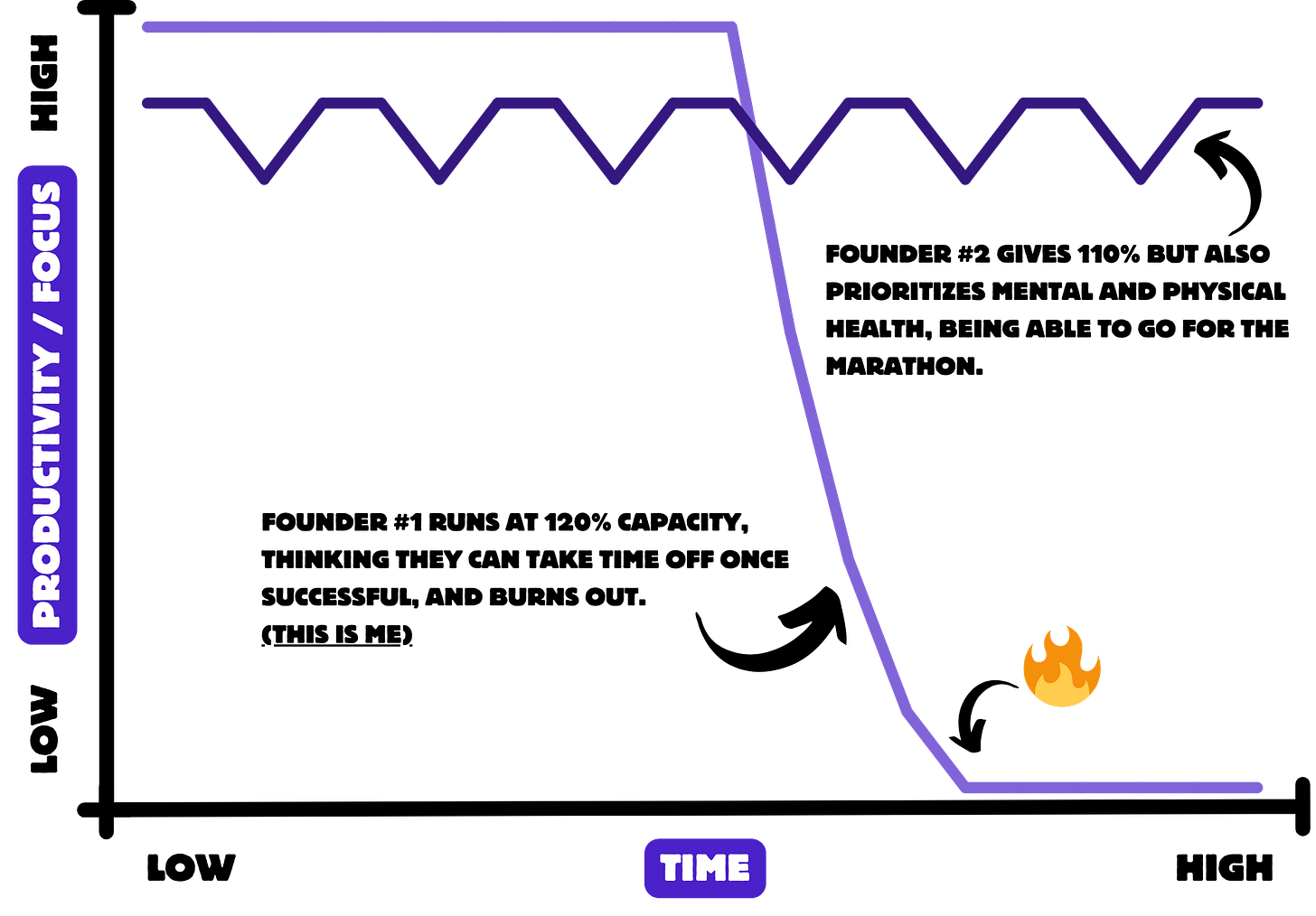5 Mistakes that Killed A Startup
Hard-Earned Insights from Building and Losing My First Business
At the end of 2019, I quit my first PM job at Tricentis to build a startup. One year later I sent my resume to various companies to get started in product management again.
Here are the 5 biggest lessons I learned from the most exciting year of my life.
#1 Make money your biggest priority
When bootstrapping a company your personal finances and the money you (can) spend on your company will be heavily connected. (Spending on your company while not being able to pay rent or eat is not an option) Therefore there are 2 components to money that you need to figure out fast:
How can I make money from day one?
How much money do I need to spend a month (personal + business)
Spending money
When I quit my job to start a company, I vastly underestimated how quickly expenses add up and runway gets burnt. I did not understand what we needed to spend money on vs. what we could get by with free tools for our business. Another issue was that I thought, I could simply “scale back” my personal expenses once I found my startup and extend my runway that way.
Have I tried scaling back while still in my full-time job - no.
Was I able to magically turn around my life from day one of “startup life” - of course not! Often I did the opposite: “I need to finish this, let me just order some food”.
Making money
Whether through raising VC investment or landing your first paying customers, you need to figure out how to bring in money immediately. Don't fall into the trap of thinking you can just work on your product for months before worrying about income.
We believed, that we could get some beta users and then just convert them. The issue with that: Both my co-founder & I had a background in an enterprise sales SaaS business, never having converted anyone into a free or paid product.
Key Money Lesson
Survive the first months by generating revenue from day one. Understand your spending, get scrappy, and do whatever it takes to start making sales immediately while you build out your full product and go-to-market strategy. Money is not optional!
#2 Follow “obvious” advice
There's a lot of ubiquitous startup advice that seems obvious, but executing it isn’t as easy as it seems. We thought we were doing everything we should, except we didn’t, because when executing the advice there were always things that made us “different” or “special”.
Obvious advice we failed to listen to
"Do things that don't scale." We obsessed over building an offering and product that could scale to a massive company. But those premature efforts drained resources away from just launching something minimal. Who cares if your pricing model works for a $100 million business if you never get off the ground?
"Launch early." We always planned to release a scrappy early version. But the temptation to "just finish one more thing" led to constant delays. When we launched 10 months in, we had an overbuilt product when a scrappy MVP after 1-2 months would have been fine and could have helped us to focus on things besides building.
You are not that special
Don't rationalize ignoring the obvious advice. Launching early, doing un-scalable work, and talking to customers seem straightforward. But you'll face constant psychological hurdles convincing yourself you're the exception. The obvious exists for a reason - it's hard-earned experience from startups before you.
#3 Solve a tiny problem well
When starting our company, we had visions of building a product management platform to compete with the likes of Aha! and Productboard.
Don’t get intimidated by competition at scale
But we made the mistake of trying to compete with their functionality from day one, rather than starting hyper-focused.
We spent months building a bloated product packed with features attempting to solve multiple problems for multiple audiences. This prevented us from shipping something compelling that did one thing exceptionally well.
Be the best thing for a small audience
The better approach would have been analyzing where the big players were still underserving customers, then zeroing in on solving just that tiny subset of needs to an amazing degree. Instead of creating something mediocre for a large audience, pick off a niche need and knock it out of the park.
Only once you have a solid product solving a niche problem for a specific user group should you even think about expanding into a broader platform. Start too ambitious, and you'll run out of resources before ever finding product-market fit.
#4 Don’t burn out
In those first few months, I was running on fumes - insanely excited and hustling nonstop to get my startup off the ground. Incorporating, building prototypes, and launching the website, there were always 1,000 tasks on the to-do list.
From hype to hate
I neglected everything else, especially my physical and mental health. Days blurred together, with me moving only between my desk and bed for weeks at a time. I gained an unhealthy amount of weight and stopped going outside.
This extreme, unsustainable pace is possible to maintain for a brief sprint. But after half a year of that grind with no balance, I started to burn out hardcore. The motivation and passion that kickstarted the journey rapidly turned into hating what I was doing. It was the beginning of the end.
This is a marathon, not a sprint
No startup dream is worth sacrificing your health and sanity over. You need sustainable habits from day one - eating well, exercising, and taking real downtime. Don't try to power through burnout. It will catch up and take you down faster than you imagine. Pace yourself for the ultra-marathon ahead instead of burning out before really getting started.
#5 Things outside of your control will happen
When starting a company, you'll inevitably face external factors beyond your control that threaten to derail your plans. For us, it was the COVID-19 pandemic striking right before our intended launch in April 2020.
You can’t control the weather
Instead of adapting, we used it as an excuse to keep delaying - just waiting a few more months until "things settle down."
The reality is the pandemic's impact on our ability to launch was relatively minimal. Some customers were hesitant to spend, and our personal lives were disrupted, but neither prevented shipping.
We wrongly treated this unplanned event as a fundamental blocker. The truth is there's always something - economic downturns, industry shifts, global crises. If you wait for the "perfect" environment, you'll never launch.
Just keep going
Don't use external factors as an excuse to procrastinate. Identify what's truly in your control to push forward regardless of circumstances. Things will never be ideal, so make constant progress rather than getting derailed by events you can't predict or change. Prepare for uncertainty as the constant startup state.
Summary
Starting a company is one of the most challenging and rewarding experiences I have had. Despite the failure, I wouldn't trade the experience for anything.
The lessons learned will stick with me forever as I pursue future entrepreneurial endeavors. The struggle bred resilience, grit, and wisdom that simply can't be taught. While painful, failing turned out to be the best thing that could have happened setting me up for success in the future.





